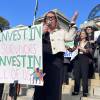Boston Police Commissioner Michael Cox expressed support Tuesday for removing arbitration as an option for fired officers to regain employment. Cox, who officially assumed leadership of the department in August, said the police department should also improve the quality of its internal investigations and its disciplinary history records.
“I think if we fire somebody, they should stay fired,” said Cox while marking his inaugural appearance on Boston Public Radio. “That being said, I think we also need to own the fact that we need to do better investigations to make sure that they stay fired — to make sure that we’re contacting the people appropriately, make sure we’re documenting things along the way, so it makes it a whole lot harder for an arbitrator to rule against us.”
Cox echoed a sentiment held by his boss, Mayor Michelle Wu, who campaigned on a pledge to achieve certain reforms through a renegotiated contract agreement with the city’s police force.
The Boston Police Patrolmen’s Association, the city’s largest police union that represents rank and file officers, attempted to halt negotiations late last year after the organization sought intervention from the Joint Labor Management Committee, the states’ collective bargaining oversight and dispute resolution agency. The Wu administration asserts the collective bargaining process is ongoing.
Wu has said publicly that establishing parameters for dismissals that cannot be appealed is a red line for her administration in the talks.
Cox said in his view, arbitration awards have "far been too generous" to police unions in representation about fired individuals coming back on.
“Either an officer belongs on the job, or they don’t — and our job is to make sure that we investigate and do all we can to separate the ones that don't belong here,” he added.
Mayor Michelle Wu announced Cox as her selection last July after the force had only interim leadership for more than a year.
The commissioner took the helm of a department sieged by multiple scandals involving past and pending investigations, among them: the conviction of a former police union head for child abuse allegations corroborated while he was an officer decades before; the sudden dismissal of a former commissioner over decades old domestic abuse allegations; and the alleged participation of at least one officer in the Jan. 6 U.S. Capitol attack.
That investigation, which has now dragged on for nearly two years, will “soon” end, Cox said, parroting an assertion from Wu last month.
“I’m not going to comment on something pending beforehand so we can have a reason for someone to arbitrate against us,” he said to laughter.
Cox also expressed support for police officers being stationed in public schools, arguing that the exposure could counter stereotypes and fear.
“When my kids were little and they were afraid of the dark, I didn't say, ‘Never walk into the dark again.’ I tried to help them through it … and let them know, you turn a light on and see it’s nothing to be afraid of here. There's nothing to be afraid of about policing,” Cox said.
“Policing being done now is better than it's ever been done in the history of policing. But the reality is the narrative that's out there is almost the opposite because of social media and things of that nature. When you have to scan the entire United States to find one example here or one example there, that is not a systemic problem.”








